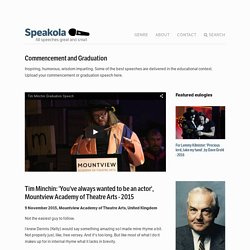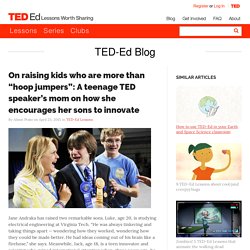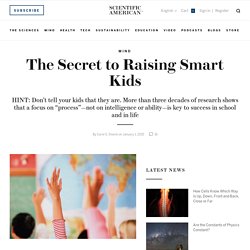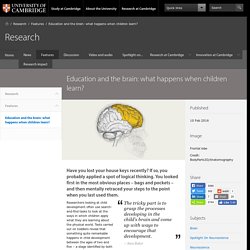

Growth Mindset vs Fixed Mindset: An Introduction. How playing an instrument benefits your brain - Anita Collins. Tim Minchin: 'You've always wanted to be an actor', Mountview Academy of Theatre Arts - 2015 — Speakola. 9 November 2015, Mountview Academy of Theatre Arts, United Kingdom Not the easiest guy to follow.

I knew Dennis (Kelly) would say something amazing so I made mine rhyme a bit. Not properly just, like, free versey. And it's too long. But like most of what I do it makes up for in internal rhyme what it lacks in brevity. I'm sorry, it's a bit actor-centric, but I know a lot of you are actors, and I knew Dennis would talk a lot about the other stuff. So this is a poem I wrote yesterday called 'You've Always Wanted to be an Actor'.
You’ve always wanted to be an actor,And your friends and you say to each other,“I want to act because I think story-telling is vital to culture”, or“I want to act so I may hold up to society a mirror”,And there’s truth in that,But let’s be honest, you really want to actBecause it’s really fun, and you quite like being clapped. And so, off you go and you get an AGENT. So you do. And yay! And that’s fine.Cos the series is a hit! Lots of love.” How to learn from mistakes. Talks to help you manage stress. Talks to form better habits. Carol Dweck: The power of believing that you can improve. How stress affects your brain - Madhumita Murgia. Kathryn Schulz: On being wrong. Larry Smith: Why you will fail to have a great career. On raising kids who are more than “hoop jumpers”: A teenage TED speaker’s mom on how she encourages her sons to innovate.
Jane Andraka has raised two remarkable sons.

Luke, age 20, is studying electrical engineering at Virginia Tech. “He was always tinkering and taking things apart — wondering how they worked, wondering how they could be made better. He had ideas coming out of his brain like a firehose,” she says. Meanwhile, Jack, age 18, is a teen innovator and scientist who gained international attention when, three years ago, he created a promising method of early cancer detection.
In a talk at TED2013 that’s been viewed nearly 4 million times, Jack Andraka shared the story behind the four-cent strip of paper that appears to be 400 times more sensitive in detecting pancreatic cancer than the previous standard — and that could work for ovarian and lung cancer too. On the heels of the release of Jack’s memoir, Breakthrough: How One Teen Innovator is Changing the World, we spoke to Jane about raising two inspiring children — and how she’s doing it with dignity and a sense of humor. How, specifically? Yes. The Secret to Raising Smart Kids. A brilliant student, Jonathan sailed through grade school.

He completed his assignments easily and routinely earned As. Jonathan puzzled over why some of his classmates struggled, and his parents told him he had a special gift. In the seventh grade, however, Jonathan suddenly lost interest in school, refusing to do homework or study for tests. As a consequence, his grades plummeted. His parents tried to boost their son's confidence by assuring him that he was very smart.
Our society worships talent, and many people assume that possessing superior intelligence or ability—along with confidence in that ability—is a recipe for success. The result plays out in children like Jonathan, who coast through the early grades under the dangerous notion that no-effort academic achievement defines them as smart or gifted. People can learn to be helpless, too, but not everyone reacts to setbacks this way. Others, meanwhile, focused on fixing errors and honing their skills. You did a good job drawing. Education and the brain: what happens when children learn?
Researchers looking at child development often use search-and-find tasks to look at the ways in which children apply what they are learning about the physical world.

Tests carried out on toddlers reveal that something quite remarkable happens in child development between the ages of two and five – a stage identified by both educationalists and neuroscientists as critical to the capacity for learning. Dr Sara Baker is a researcher into early childhood at the Faculty of Education. She is interested in the role of the brain’s prefrontal lobe in how young children learn to adapt their understanding to an ever-shifting environment. Many of her studies chart changes in children’s ways of thinking about the world. She uses longitudinal designs to examine the shape of individual children’s learning curves month by month. Research by Baker and colleagues is contributing to an understanding of the acquisition of skills essential to learning.
Most three-year-olds find the ‘opposites’ task hard.